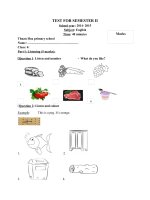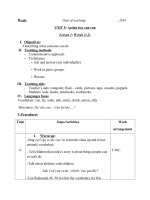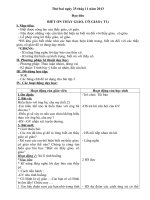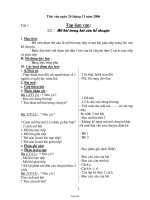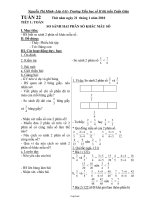giáo án lớp 4 family and friends
Bạn đang xem bản rút gọn của tài liệu. Xem và tải ngay bản đầy đủ của tài liệu tại đây (115.54 KB, 7 trang )
Week:
Date of teaching:
,
, 2014
UNIT 5: Action boy can run
Lesson 1: Words (1,2)
Objectives:
-Describing what someone can do
II. Teaching methods:
- Communicative approach.
- Techniques:
+ Ask and answer (say individually)
I.
+ Work in pairs/ groups.
+ Discuss.
Teaching aids:
- Teacher’s aids: computer, flash – cards, pictures, tape, cassette, puppets.
- Students’ aids: books, notebooks, workbooks.
IV. Languages focus:
Vocabulary: run, fly, walk, talk, swim, climb, action, silly
III.
Structures: He/ she can… Can he/she….?
V.Procedures:
Time
Steps/Activities
Work
arrangement
Warm up:
-Sing Let's go to the zoo! to warm the class up and revise
animals vocabulary.
I.
4’
- Tell children that today's story is about things people can
or can't do.
-Talk about abilities with children.
Ask Can you swim / climb / run quickly?
-Use flashcards 45- 50 to elicit the vocabulary for this
T-WC
lesson.
-Hold them up one at a time and say the words for children
to repeat.
-Model an action (climbing, talking, swimming etc.) for
children to imitate at their desks.
II.
New lesson.
1.Vocabulary:
- run: chạy
6’
- fly: bay
- walk: đi bộ
-swim: bơi
-climb:trèo
T Class
- action: hành động
-silly:ngốc nghếch
T models the vocabulary
*Check vocabulary: R.O.R
2. Listen and read:
-Listen, point and repeat. Ask children to look at the
pictures of the different items.
- Play the first part of the recording for children to listen
and point to the appropriate picture.
-Play the second part of the recording for children to
5’
repeat.
-Play the recording all the way through again for children
Whole class
to listen and point and then repeat the words in chorus.
3.Listen and read.
- Use Story poster 5 to present the story.
-Ask What has Billy got? Encourage predictions from
different members of the class.
- Ask children to look at the poster while you play the
recording for them to listen.
Group work
-Point to each speech bubble in turn as you hear the text.
Ask comprehension questions, e.g.
10’
- Can Action Boy run / fly / walk / talk?
Exercise 1: Ask children to look at the pictures carefully,
find and circle the words walk, run, climb, talk, swim, fly.
Children then work in pairs to compare their works.
Exercise 2: Ask children to look at the pictures, identify
the actions and write the words for each action. Children
then sit in pairs and practice saying the words.
1.
5’’
2.
3.
4.
5.
5’
Fl III.Consolidation:
y Extra Activity 1 PMB p. 20:
Cl -Ask children to look at the table, write Yes, I can or
im No, I can’t.
b -Children work in pairs, ask and answer questions to
W know what someone can or can’t do.
al -Ask them to write the answers down. E. g. Can you
k swim? Yes, I can. No, I can’t. He / She can’t run fast.
Ru -Talking about likes or dislikes:
n -Ask children to work in groups of 4 – 6. In turns, they
Ta talk about the food they like or dislike.
lk -A secretary takes notes of the likes/ dislikes.
-Ask one child from each group to report before the
class.
Homework
Pairs work
Group work
-
Encourage Ss to for Unit 5-lesson 2
Learn by heart all the new word.
Individually
Week:
Date of teaching:
,
, 2014
UNIT 5: Action boy can run!
Lesson 2: Grammar(1,2)
I.Objectives:
- Talking about what someone can or can’t do
- Teaching methods:
-
Communicative method.
Techniques: + Work in pairs and individually
+ Ask and answer.
+ Work in groups, discuss.
Teaching aids:
- Teacher’s aids: pictures, word cards, extra board, tape, cassette.
- Student’s aids: book, notebook, workbook.
II. Language focus:
Can she/he…?
She /he can …….?/
III. Procedures:
I.
Time
Steps/Activities
Work
arrangement
I.Warm up:
-Ask children if they remember Action Boy and what he can or
can’t do.
-Put flashcards 45- 50 on the board.
5’
-Children work in pairs and take turns to use the actions on the T Class
board to say what Action Boy can or can't do.
Ex: Action Boy can run. Action Boy can’t fly.
-Ask children to take turns to ask and answer questions about
what Action Boy can do. E.g. Can Action Boy walk? Yes, he
can.
II. New lesson:
Find the healthy activities:
-Give a copy of the Values worksheet (PMB p. 19) to each Listen
student.
carefully
-Ask them to look at the pictures from Exercise carefully, find
the healthy activities and color them.
15’
-They then work in pairs and discuss about the healthy
activities.
Pairs work
-Encourage children to state a reason why the activity is
healthy or not.
Individually
-Ask some children to talk before the class.
Exercise 1: Ask children to look at the pictures and identify if
a person or an animal can or can’t do something. They then
write can or can’t in the gaps. Children then work in pairs and
compare the answers with their partner.
T Class
2. can’t, 3. can, 4. can’t, 5. can, 6. can’t
10’
Exercise 2: Ask children to look at the pictures, identify the
things someone can or can’t do and answer the questions with
Yes, … can or No, … can’t. They then work in pairs and
practice asking and answering. Ask some children to go to the
board and write the answers.
2. Yes, he can.
3. Yes, she can.
5. Yes, it can.
6. No, it can’t.
Pairs work
group work
4. No, she can’t
III.Consolidation:
Game :Give each child a piece of plain paper.
Individually
-They quickly draw an action figure or doll.
5’
-Children work in pairs, ask and answer about what their toy/
character can or can’t do.
-Children then take turns to use the actions they’ve learnt to
say what their toy / character can or can't do.
-Ask some of the child to talk before the class.
IV.Homework:
-
Learn by heart all the new structure.
Prepare the next lesson 3: Song


